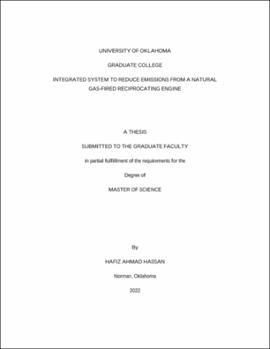| dc.description.abstract | Internal Combustion (IC) engines are a significant source of environmental pollution; therefore, global efforts are being made for their growth and sustainability. Mainly, the Natural Gas-Fired Reciprocating Engines (NGFRE), which are naturally aspirated, exhibit increased combustion instability and higher emissions, predominantly methane (CH4) and Volatile Organic Compounds (VOCs) at lower loads, resulting in restrictions on the operational envelope of such engines. This thesis reviews some of the emission reduction technologies for NGFREs and presents the experimental investigation of an integrated system to reduce emissions and improve the combustion performance of an NGFRE. The integrated system consists of an air management package and integrated sensors including an amperometric NOx/O2 sensor, exhaust temperature thermocouple, pressure transducers and vibration sensors. A comprehensive electrochemical model for the NOx/O2 sensor is developed to quantitatively analyze the degradation of the sensor's electrode material under a harsh two-stroke engine exhaust environment. The NGFRE under study is a naturally aspirated, stationary, lean-burn engine and is used in the oil and gas industry for the production, storage, processing and transmission of natural gas extracted from wells. Experiments were carried out using natural gas and natural gas/propane blends at different load steps, and combustion performance, as well as the emissions, were analyzed. For natural gas fuel, the results show that the standard deviation of peak pressure and indicated thermal efficiency (ITE) improved by 67.4 psi and 4.2% respectively, at 40% load. Similarly, CH4 and Nitrogen Oxides (NOx) emissions reduced considerably by 84% and 63% respectively, whereas an abrupt behavior in Carbon Monoxide (CO) and NOx emissions was observed. At 60% load, the ITE improved by 3.8% and the CH4 emissions were reduced by 68%. The reduction in VOCs emissions was 63% at 40% load and 69% at 60% load. The findings of this research provide evidence of the effectiveness of the integrated system in improving the sustainability of NGFREs. In general, this technology can be implemented on air-assisted combustion applications to improve combustion performance and, consequently, reduce emissions. The next step in the research is to develop a data analytics model using machine learning techniques to predict the optimum operation of the integrated system at different loads. The test procedure and data analysis techniques described in this thesis will be used in other research tasks, such as obtaining the training data for the machine learning model and investigating natural gas/hydrogen blends as fuel. | en_US |
